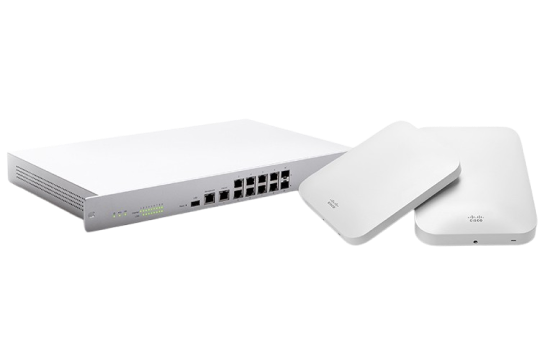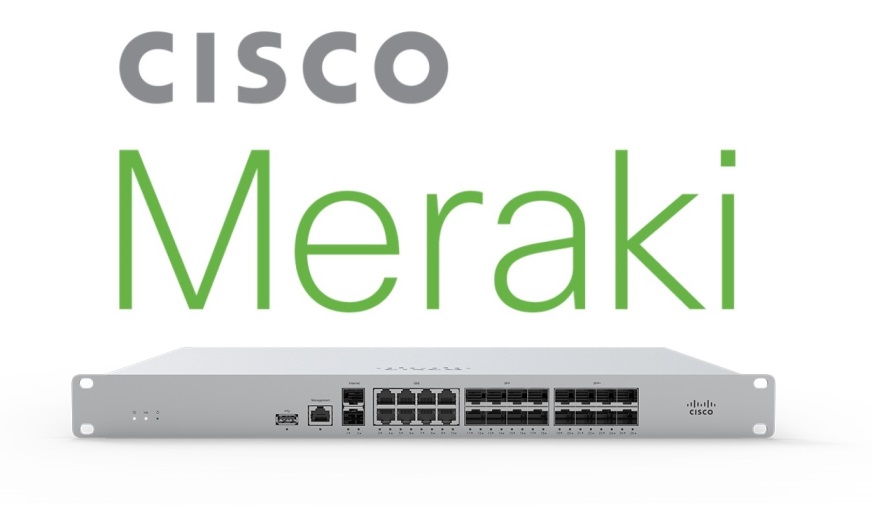
Choosing the right firewall solution is crucial for protecting your business network and ensuring seamless connectivity. With an ever-growing array of threats and increasing demands for flexible network management, finding a solution that balances security, usability, and scalability is more important than ever. Cisco Meraki MX and Fortinet FortiGate are two of the most prominent names in the market, each offering distinct features and approaches to network security.
In this article, we will compare Meraki vs Fortinet. This comparison aims to provide a thorough understanding of both platforms, examining their key features, management capabilities, and deployment scenarios.

The Cisco Meraki MX series offers a fully cloud-managed firewall solution, integrating seamlessly into the broader Meraki ecosystem. This approach eliminates the need for complex on-premises configurations, making deployment and management significantly easier.
Fortinet FortiGate is a hardware-centric firewall solution that offers robust security features and flexible deployment options. While it provides advanced threat protection, its reliance on on-premises management can make it less accessible for organizations without dedicated IT resources.
Cisco Meraki MX is designed with simplicity and usability in mind. The Meraki Dashboard enables IT teams to manage all devices in one place, with intuitive interfaces and automation features like automatic firmware updates. This cloud-based management reduces the complexity of network administration, making it accessible even for smaller IT teams.
In contrast, Fortinet FortiGate relies heavily on on-premises management. While it offers granular control, the interface can be challenging to navigate, and updates require manual intervention. For businesses seeking efficiency and ease of use, Meraki MX offers a significant advantage.
Both Meraki MX and FortiGate provide robust security capabilities, but Meraki’s integration with Cisco’s Talos Threat Intelligence offers a distinct edge. Meraki MX delivers:
FortiGate also delivers strong protection, but its traditional model often requires more frequent manual updates and configurations, increasing the risk of delays in addressing emerging threats.
The Meraki vs Fortinet debate often highlights scalability. Meraki MX excels in this area with its SD-WAN capabilities, which simplify the deployment of secure, scalable networks across multiple sites. Businesses adopting hybrid or remote work models will find Meraki’s cloud-first approach particularly advantageous.
FortiGate, while scalable, is more hardware-dependent. Expanding a FortiGate deployment often requires significant investment in additional appliances, making it less flexible for rapidly growing organizations.
Cisco Meraki MX’s licensing model is straightforward, bundling hardware, software, and support into a single subscription. This predictability helps businesses manage costs effectively while ensuring they have access to the latest features and updates.
Fortinet FortiGate, on the other hand, uses a tiered licensing structure that can become complex and costly. Businesses may need to purchase separate licenses for additional features, creating challenges in budgeting and management.

The Meraki Dashboard centralizes network management, allowing IT teams to oversee multiple devices and locations from a single platform. This simplicity reduces the administrative burden and minimizes the risk of errors.
With built-in threat intelligence and advanced security features, Meraki MX protects against evolving cyber threats. The integration of adaptive policies and cloud-based updates ensures your network remains secure at all times.
Meraki’s unified licensing model provides predictable costs, eliminating hidden fees and enabling businesses to plan their budgets with confidence. Stratus Informational Systems also offers excellent support for Cisco Meraki products, adding further value.
For small to mid-sized businesses planning to expand, Meraki MX offers unparalleled scalability. Its SD-WAN capabilities make it easy to add new locations without significant infrastructure changes.
Organizations adopting hybrid work environments benefit from Meraki MX’s seamless integration with cloud infrastructure, enabling employees to have secure remote access.
Enterprises with geographically dispersed networks can leverage Meraki MX’s centralized management to maintain consistent security and performance across all locations.
When comparing Fortinet vs Cisco Meraki firewall solutions, it’s clear that Cisco Meraki MX offers a superior solution for businesses seeking simplicity, scalability, and robust security. The cloud-managed approach of Meraki MX not only reduces the complexity of network management but also ensures that businesses are prepared for future growth and challenges.
While Fortinet FortiGate provides solid security features, its hardware-focused model and complex licensing structure make it less ideal for organizations prioritizing efficiency and flexibility. Cisco Meraki MX stands out as the ideal choice for businesses looking for a future-proof firewall solution.
Ready to revolutionize your network security?
Contact Stratus Informational Systems to learn more about Cisco Meraki MX and discover the perfect solution for your business needs. Our experts are here to guide you every step of the way.

Stay informed about our newest releases and updates